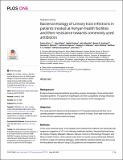Files in this item
Bacterial etiology of urinary tract infections in patients treated at Kenyan health facilities and their resistance towards commonly used antibiotics
Item metadata
| dc.contributor.author | Kiiru, Susan | |
| dc.contributor.author | Maina, John | |
| dc.contributor.author | Katana, Japhet | |
| dc.contributor.author | Mwaniki, John | |
| dc.contributor.author | Asiimwe, Benon B. | |
| dc.contributor.author | Mshana, Stephen E. | |
| dc.contributor.author | Keenan, Katherine | |
| dc.contributor.author | Gillespie, Stephen H. | |
| dc.contributor.author | Stelling, John | |
| dc.contributor.author | Holden, Matthew T. G. | |
| dc.contributor.author | Consortium, HATUA | |
| dc.contributor.author | Kiiru, John | |
| dc.date.accessioned | 2023-05-29T10:30:31Z | |
| dc.date.available | 2023-05-29T10:30:31Z | |
| dc.date.issued | 2023-05-26 | |
| dc.identifier | 286806527 | |
| dc.identifier | 8e3fe286-b4ec-4993-84a8-cc36075abbe0 | |
| dc.identifier | 85160378568 | |
| dc.identifier.citation | Kiiru , S , Maina , J , Katana , J , Mwaniki , J , Asiimwe , B B , Mshana , S E , Keenan , K , Gillespie , S H , Stelling , J , Holden , M T G , Consortium , HATUA & Kiiru , J 2023 , ' Bacterial etiology of urinary tract infections in patients treated at Kenyan health facilities and their resistance towards commonly used antibiotics ' , PLoS ONE , vol. 18 , no. 5 , e0277279 . https://doi.org/10.1371/journal.pone.0277279 | en |
| dc.identifier.issn | 1932-6203 | |
| dc.identifier.other | RIS: urn:A15BC90C4CA8E4E4E64D7F442F1ABF78 | |
| dc.identifier.other | ORCID: /0000-0001-6537-7712/work/136288793 | |
| dc.identifier.other | ORCID: /0000-0002-9670-1607/work/136288894 | |
| dc.identifier.other | ORCID: /0000-0002-4958-2166/work/136288930 | |
| dc.identifier.uri | https://hdl.handle.net/10023/27691 | |
| dc.description | Funding: The Holistic Approach to Unravel Antibacterial Resistance in East Africa (HATUA) is a 3-year Global Context Consortia Award (MR/S004785/1) funded by the National Institute for Health Research, Medical Research Council and the Department of Health and Social Care. The award is also part of the EDCTP2 program supported by the European Union. | en |
| dc.description.abstract | Background Evidence-based empirical antibiotic prescribing requires knowledge of local antimicrobial resistance patterns. The spectrum of pathogens and their susceptibility strongly influences guidelines for empirical therapies for urinary tract infections (UTI) management. Objective This study aimed to determine the prevalence of UTI causative bacteria and their corresponding antibiotic resistance profiles in three counties of Kenya. Such data could be used to determine the optimal empirical therapy. Methods In this cross-sectional study, urine samples were collected from patients who presented with symptoms suggestive of UTI in the following healthcare facilities; Kenyatta National Hospital, Kiambu Hospital, Mbagathi, Makueni, Nanyuki, Centre for Microbiology Research, and Mukuru Health Centres. Urine cultures were done on Cystine Lactose Electrolyte Deficient (CLED) to isolate UTI bacterial etiologies, while antibiotic sensitivity testing was done using the Kirby-Bauer disk diffusion using CLSI guidelines and interpretive criteria. Results A total of 1,027(54%) uropathogens were isolated from the urine samples of 1898 participants. Staphylococcus spp. and Escherichia coli were the main uropathogens at 37.6% and 30.9%, respectively. The percentage resistance to commonly used drugs for the treatment of UTI were as follows: trimethoprim (64%), sulfamethoxazole (57%), nalidixic acid(57%), ciprofloxacin (27%), amoxicillin-clavulanic acid (5%), and nitrofurantoin (9%) and cefixime (9%). Resistance rates to broad-spectrum antimicrobials, such as ceftazidime, gentamicin, and ceftriaxone, were 15%, 14%, and 11%, respectively. Additionally, the proportion of Multidrug-resistant (MDR) bacteria was 66%. Conclusion High resistance rates toward fluoroquinolones, sulfamethoxazole, and trimethoprim were reported. These antibiotics are commonly used drugs as they are inexpensive and readily available. Based on these findings, more robust standardised surveillance is needed to confirm the patterns observed while recognising the potential impact of sampling biases on observed resistance rates. | |
| dc.format.extent | 14 | |
| dc.format.extent | 1458793 | |
| dc.language.iso | eng | |
| dc.relation.ispartof | PLoS ONE | en |
| dc.subject | RM Therapeutics. Pharmacology | en |
| dc.subject | DAS | en |
| dc.subject | MCC | en |
| dc.subject.lcc | RM | en |
| dc.title | Bacterial etiology of urinary tract infections in patients treated at Kenyan health facilities and their resistance towards commonly used antibiotics | en |
| dc.type | Journal article | en |
| dc.contributor.sponsor | Medical Research Council | en |
| dc.contributor.institution | University of St Andrews. School of Geography & Sustainable Development | en |
| dc.contributor.institution | University of St Andrews. School of Medicine | en |
| dc.contributor.institution | University of St Andrews. Sir James Mackenzie Institute for Early Diagnosis | en |
| dc.contributor.institution | University of St Andrews. Centre for Biophotonics | en |
| dc.contributor.institution | University of St Andrews. Biomedical Sciences Research Complex | en |
| dc.contributor.institution | University of St Andrews. Infection and Global Health Division | en |
| dc.contributor.institution | University of St Andrews. Global Health Implementation Group | en |
| dc.contributor.institution | University of St Andrews. St Andrews Bioinformatics Unit | en |
| dc.identifier.doi | https://doi.org/10.1371/journal.pone.0277279 | |
| dc.description.status | Peer reviewed | en |
| dc.identifier.grantnumber | MR/S004785/1 | en |
This item appears in the following Collection(s)
Items in the St Andrews Research Repository are protected by copyright, with all rights reserved, unless otherwise indicated.

